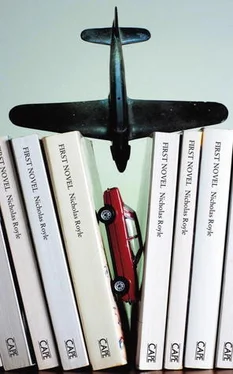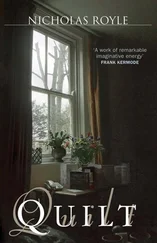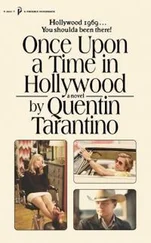In his spare time in the barracks, Ray listened to jazz records on an old gramophone the base commander had picked up on a trip to the mainland. Milt Jackson and Thelonious Monk riffed until the needle was practically worn away. No one could say where the records had come from. Some nights he got out of his head on Kulmbacher lager they had flown over from Germany. It was dropped at night, illegally, in wooden crates that burst open on the beach, scattering the ghost crabs that rattled about on the foreshore. He drank steadily — sometimes with the other men, usually on his own — and spoke to none of his comrades about his reasons for joining the RAF.
When the conditions were right — and they usually were between June and March, outside the rainy season — and Squadron Leader William Dunstan was piloting the mission, they would take a small detour before heading for the airstrip. On returning from Mombasa or a tour of the island, Billy Dunstan would take the Hercules north to Uroa where he would swoop down over the beach and buzz the aircraftmen and flight lieutenants stationed there. Ray was soon organising his time around Dunstan’s schedule, so that when the flamboyant squadron leader was in charge, Ray was invariably waiting at the airstrip to go up with the crew. Dunstan ran a pretty relaxed ship.
The men at Uroa station would hear the Hercules’ grumbling approach rise above the constant susurration of the wind in the palms and run out on to the beach waving their arms. Dunstan would take the plane down as low as possible; on occasion he even lowered the landing gear and brushed the surface of the beach a few hundred yards before or after the line of men, raising huge ballooning clouds of fine white sand.
After his pass, the line of men on the beach applauding as they turned to watch, Dunstan would tilt to starboard over the ocean and climb to a few hundred feet before doubling back and flying down the coast to the base at Bwejuu. Every time, Ray would be standing hunched up in the cockpit behind Dunstan for the best view. The squadron leader enjoyed showing off; Ray’s pleasure lay in watching Dunstan’s reaction as he risked going lower and lower each time, but there was more to it than that. There was another element to it for which Ray had yet to find expression.
The next day, during a break from duties, Ray saw a lone figure standing by the shoreline. He wandered over, clearing his throat once he was within earshot, and came to a halt only when he had drawn alongside. The two men looked out at the horizon. Some 300 yards out, the reef attracted a flurry of seabirds. They hung in the air as if on elastic, a short distance above the water.
‘I’m sorry I didn’t get there sooner,’ Ray said. ‘In time to stop them, I mean.’
Flynn shrugged. ‘They’d have got me another time,’ he said.
‘Probably. No harm done, eh?’
‘I was scrubbing away at my uniform for at least an hour this morning,’ the younger man said.
Ray felt the breeze loosen his clothes and dry the sweat on his body.
‘I’ve heard stories,’ Flynn continued, ‘about beheadings in the Mau Mau Uprising. They used machetes. They’d cut someone’s head off and the eyes would still be blinking, still watching them. What must that be like? Still being able to see.’
They watched the horizon without speaking for a few moments. Ray broke the silence.
‘I’m not sure you should be left alone with your thoughts.’
They watched the rise and fall of the seabirds, at this distance like a cloud of midges.
‘Do you leave the base much?’ Ray asked.
‘I go to Stone Town…’
Ray turned to look at the young airman. He was wearing fatigues and a white vest. His eyes, which didn’t deviate from the view in front of him, were a startling blue. He didn’t seem to want to elaborate on what he got up to in Stone Town. Ray bent down and picked up a shell. He turned it over and ran his thumb over the ridges and grooves.
‘There you go,’ he said, handing it to Flynn. ‘Don’t say I never give you anything.’

‘Here. Pull in here,’ I said, pointing to the opening on the left.
Susan Ashton swung the wheel of her Golf GTI and we pulled into the car park by Hatton Cross Tube station.
‘I can give you a lift all the way back into London, you know,’ she said, leaning back in the driver’s seat, the upholstery sighing beneath her weight.
I smiled at her and shook my head. ‘It’s OK,’ I said. ‘It’s out of your way.’ I looked out of the window. It was early evening, late autumn, getting dark. Enough artificial light to see her eyes glimmering. ‘I like this place. That’s why I asked you to drop me here. And it’s close to where you live. You’re not far from here, are you?’
Susan Ashton’s thick chestnut hair rocked forward whenever she moved, two acute angles sweeping towards her cheekbones. I looked at her right hand on the steering wheel. Her left on the edge of her seat, nearest to me. No rings. She and Tony didn’t even live together. She lived in Feltham; he was down the road in East Bedfont. Or the other way around. They were thinking about moving in together. Considering buying a place.
She wasn’t sure.
She wasn’t sure about it , she wasn’t sure about him .
I knew this because we had sat up in the hotel bar until four while she told me all about it. We’d been the only delegates on the staff development course who hadn’t gone up to bed when the bartender had told us he had a home to go to.
I couldn’t figure out if I’d ever looked at her twice before the course. Working in the same office for three years, I’d always found her pleasant, but maybe she was taken, and I definitely was, so it was never an issue.
Veronica and I had been together four years, both living in London but both from the north. The twins had been born two years after we got together — that’s two years before Susan Ashton steered her car, with me sitting in the passenger seat, into Hatton Cross Tube station car park — and Veronica and I had found it difficult adjusting to life as parents. There’s no point denying it. But still it was never an issue — me and Susan Ashton. Sometimes it just isn’t. And then you get thrown together on a staff development weekend, even though you have no interest in staff development. No real interest in the company you work for. The event was compulsory, a residential course in a Thames Valley hotel. I had watched her in the group sessions. Delighting in others’ company. Outgoing, fun, mildly flirtatious, yet clearly holding something back.
‘It’s just a couple of miles over there… Tony’s more…’ Susan Ashton waved vaguely to the south.
‘I know.’ I shifted around in my seat so I was looking directly at her. As I did so, the sky suddenly closed in around the car with a deafening roar, jet engines powering down. Flaps up, gear down, close enough to touch. Or so it seemed. We both swivelled in our seats to watch the aircraft descend further. The runway was only a few hundred yards away beyond the wire-mesh netting.
‘That was a big one,’ I said. ‘Jumbo. 747.’
She nodded. Her body still angled backwards, she rested her head on her arm and looked at me. She was wearing a white cotton blouse with three, maybe four buttons undone. No necklace or pendant. I gave up trying not to look.
‘It’ll be all right, Tony and that,’ I said, as if I cared. I imagined touching her face with my hand, stroking the backs of my fingers against her cheek.
Another plane overflew the car. It was smaller, a 737, but still the nearness of it was overwhelming. I was becoming an increasingly nervous flyer as the years went by, yet here I was, happy to sit underneath the flight path. I had recently read that statistically London was overdue for a major air disaster. That would be one for them to chew on, those poor bastards who took refuge in the comfort of statistics: it’s safer than crossing the road; you’re more likely to die in a car crash; hit by lightning. Those were the people who didn’t mind who hit the ground at ninety degrees and 500 miles an hour still strapped into their seat, as long as it wasn’t them.
Читать дальше













